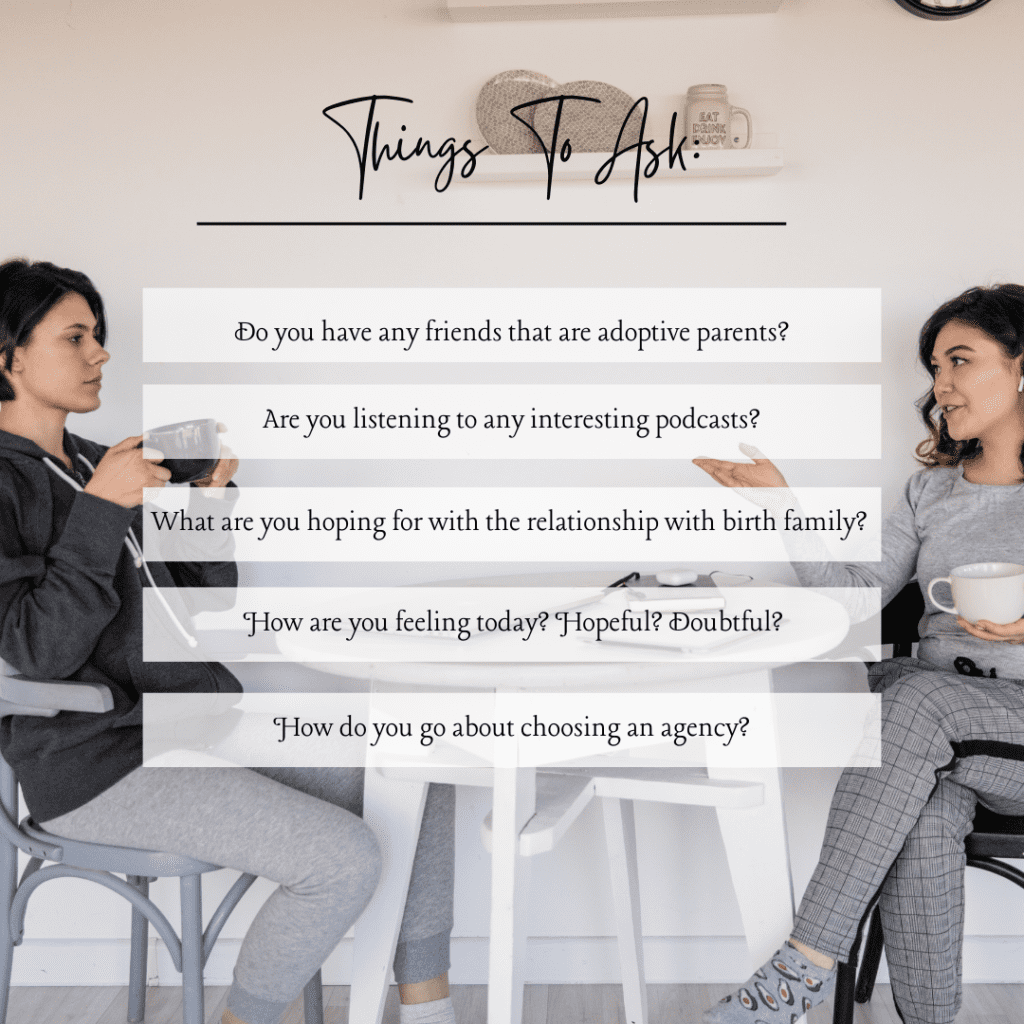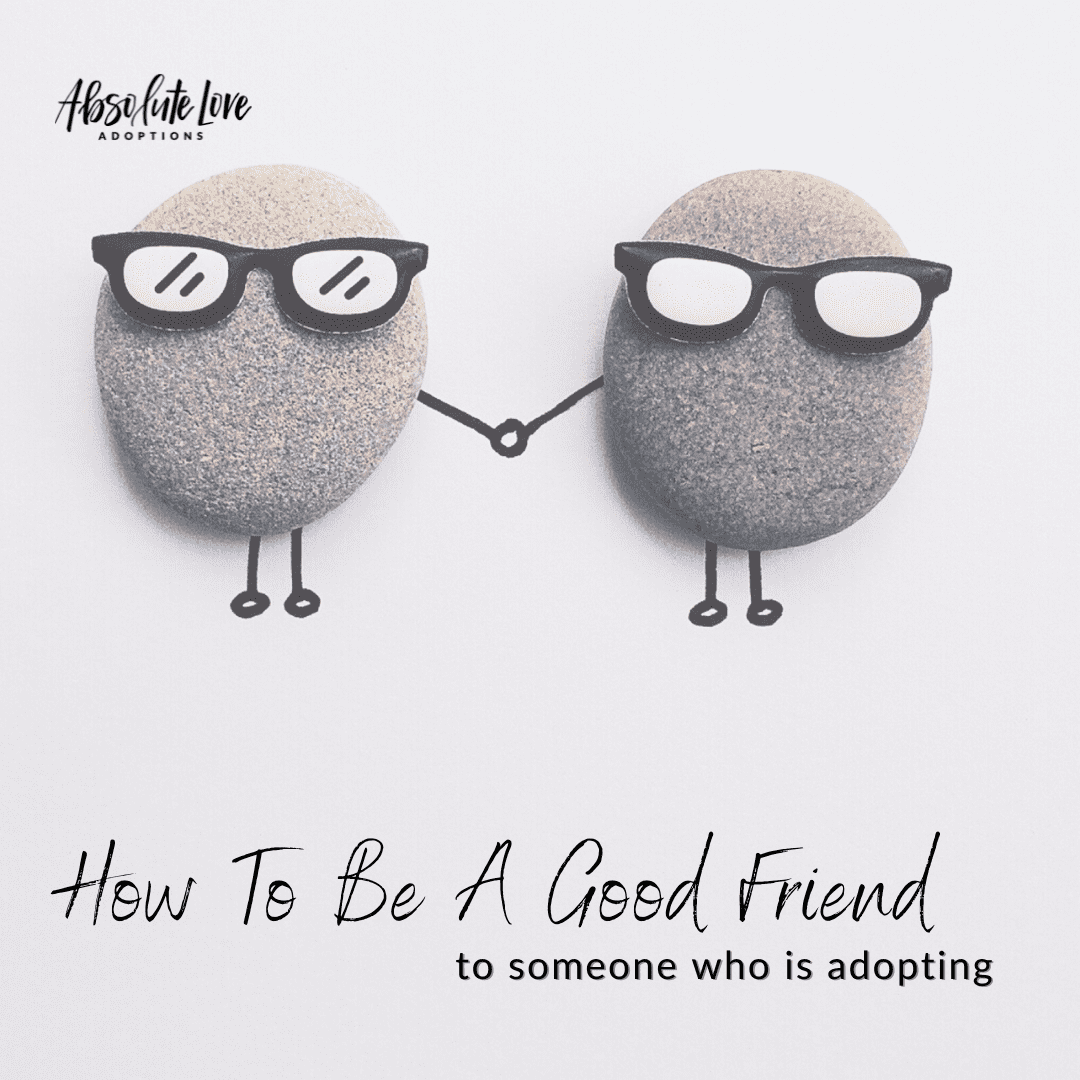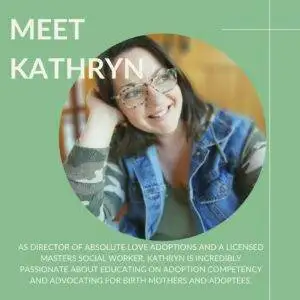As a friend or family member of someone who is adopting, you may be curious to know what the experience of preparing to adopt looks like. Your friend or family member may have shared about the mountains of paperwork, or the uncertain timeline, but you may curiosity as to how you can support them through their process.
TIMELINES: Adoption is an unpredictable process with an unknown timeline. Generally speaking, the process looks like this:

WHAT IS A HOME STUDY?
Individuals pursuing adoption are put through an intense assessment process called the “Home Study.” They have to provide a mountain of paperwork and endure hours of interviews all of which are compiled to create the document that officially approves them to adopt.
This process can take a few months to complete. To learn more about home study, read our blog.
FUN FACT: You may be asked to complete a reference/character assessment during this stage of their process.
THE EDUCATION:
Your friend/family will be learning a TON about adoption including the core issues that affected adoption: loss, rejection, guilt/shame, grief, identity, intimacy, mastery/control.
While you would not be asked to engage in the same intensity of training as the adoption person, your efforts to understand some basics will greatly enhance your ability to support the adopting family, and eventually, their child.

ADOPTION LANGUAGE: There are some basic words we recommend you use, and those we suggest you don’t when talking about adoption. Here are some:
OWN CHILD vs BIOLOGICAL CHILD: Use the words biological child; “Own” implies the child they do have isn’t as desirable as a biological child.
GIVE UP/GIVE AWAY vs PLACED: Adoption is not giving away a baby, it is making an adoption plan or placing a child for adoption. Say “placed for adoption.”
MY CHILD vs MY ADOPTED CHILD: Don’t make the distinction between “this is my grandchild” and “this is my adopted grandchild”. Sharing their adopted status is not necessary. Say “my child”.
EXPECTANT MOM vs BIRTH MOM: A woman considering adoption is an expectant mom. Once she places, she becomes a birth mom.
ADOPTION LOSS: While adoption is often depicted as an overwhelmingly positive experience, the whole truth is that it is also loss and sorrow.
- There is loss for the birth family who placed a child. While birth parents choose adoption willingly, it is not without significant emotion. The impacts are lifelong.
- There is loss for the child who is separated from their family. Research has concluded that an infant can recognize their mother in smell, sound, cadence of their voice and rhythm of their movements. Maternal separation, even at birth, activates the part of the brain that processes fear, which has implications for their lifelong development. Learn more here.
- There is also (typically) loss for an adopting person. Often adopting parents report years of infertility, miscarriages, and a loss of opportunity to experience pregnancy, or to have biological mirrors in their children.
Learn more about adoption as both “good” and “bad” here
OPENNESS: Research is clear that a connection to birth family is extremely important for children. Adoptees who have relationships with birth family report higher self esteem, well being and closeness to adoptive family. A child hearing positive things about their birth family and feeling that their family understands their desire to have connection (as long as it is safe) is essential in creating a space for an adoptee to thrive.
TIP: Your friend/family will be having a relationship with a birth mother/father, and it won’t be scary or dangerous.
Learn more about Birth Mothers.
RACE: If your person is open to adopting a child of a different race than your family, know that the journey of a multi-racial family by adoption is unique. Learning about race and its impact on people will be absolutely critical. Focus on understanding concepts like microaggressions, racism, institutional racism, white privilege and colorism.
This is a good resource to start learning, and this one too.

Ask them about the process. The process is full of highs, lows, and times that feel stagnant. Your friend may feel hopeful at times, or impatient at others. Adopting parents don’t always know how to introduce conversation about what they’re experiencing.
Rather than asking questions that feel like pressure (When will you get a match!? Have you been matched yet!?) ask more generally, “any updates in your process?” They’ll share what they’re comfortable sharing.
Host a celebration, AFTER the baby comes home. The uncertainty of placement and all of the “what if’s” makes it hard to celebrate before placement. Ultimately, a mom planning adoption might decide to parent at the last moment, which is devastating to adopting parents. Wait to celebrate this baby specifically until they are officially placed in their care. You CAN help them get the supplies they’ll need to care for *any* baby by having a shower ahead of time but think gender neutral.
Buy them baby books to start building an adoption competent library. Use this list of our favorite books to help!
The addition of a child via adoption to your friend or family circle is an exciting moment! Enjoy this experience alongside your friend!
Summary / Breakdown
A thorough evaluation involving interviews, document review, and a home visit to assess readiness and environment.
Basic adoption concepts: grief, identity, loss, openness, and adoption-specific language.
Avoid terms like “give away,” “own child,” or “birth mother”—use “place for adoption,” “biological child,” and “expectant mom.”
Ask “Any updates?” rather than pressuring, and be there for the highs and lows.
Share baby shower support early, but wait to celebrate final placement until the child is home.
Offer meals, childcare, baby books, gender-neutral supplies, and a non-judgmental ear.
Learn about racial equity and openness in adoption; discuss it sensitively if they bring it up.





